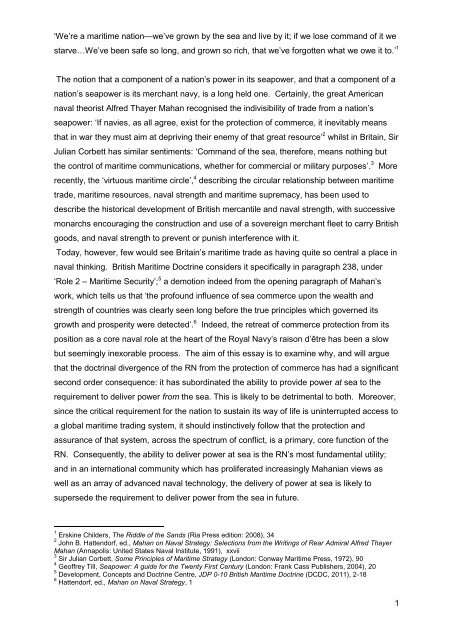90 percent by sea - Defence Academy of the United Kingdom
90 percent by sea - Defence Academy of the United Kingdom
90 percent by sea - Defence Academy of the United Kingdom
Create successful ePaper yourself
Turn your PDF publications into a flip-book with our unique Google optimized e-Paper software.
‘We’re a maritime nation—we’ve grown <strong>by</strong> <strong>the</strong> <strong>sea</strong> and live <strong>by</strong> it; if we lose command <strong>of</strong> it we<br />
starve…We’ve been safe so long, and grown so rich, that we’ve forgotten what we owe it to.’ 1<br />
The notion that a component <strong>of</strong> a nation’s power in its <strong>sea</strong>power, and that a component <strong>of</strong> a<br />
nation’s <strong>sea</strong>power is its merchant navy, is a long held one. Certainly, <strong>the</strong> great American<br />
naval <strong>the</strong>orist Alfred Thayer Mahan recognised <strong>the</strong> indivisibility <strong>of</strong> trade from a nation’s<br />
<strong>sea</strong>power: ‘If navies, as all agree, exist for <strong>the</strong> protection <strong>of</strong> commerce, it inevitably means<br />
that in war <strong>the</strong>y must aim at depriving <strong>the</strong>ir enemy <strong>of</strong> that great resource’ 2 whilst in Britain, Sir<br />
Julian Corbett has similar sentiments: ‘Command <strong>of</strong> <strong>the</strong> <strong>sea</strong>, <strong>the</strong>refore, means nothing but<br />
<strong>the</strong> control <strong>of</strong> maritime communications, whe<strong>the</strong>r for commercial or military purposes’. 3 More<br />
recently, <strong>the</strong> ‘virtuous maritime circle’, 4 describing <strong>the</strong> circular relationship between maritime<br />
trade, maritime resources, naval strength and maritime supremacy, has been used to<br />
describe <strong>the</strong> historical development <strong>of</strong> British mercantile and naval strength, with successive<br />
monarchs encouraging <strong>the</strong> construction and use <strong>of</strong> a sovereign merchant fleet to carry British<br />
goods, and naval strength to prevent or punish interference with it.<br />
Today, however, few would see Britain’s maritime trade as having quite so central a place in<br />
naval thinking. British Maritime Doctrine considers it specifically in paragraph 238, under<br />
‘Role 2 – Maritime Security’; 5 a demotion indeed from <strong>the</strong> opening paragraph <strong>of</strong> Mahan’s<br />
work, which tells us that ‘<strong>the</strong> pr<strong>of</strong>ound influence <strong>of</strong> <strong>sea</strong> commerce upon <strong>the</strong> wealth and<br />
strength <strong>of</strong> countries was clearly seen long before <strong>the</strong> true principles which governed its<br />
growth and prosperity were detected’. 6 Indeed, <strong>the</strong> retreat <strong>of</strong> commerce protection from its<br />
position as a core naval role at <strong>the</strong> heart <strong>of</strong> <strong>the</strong> Royal Navy’s raison d’être has been a slow<br />
but seemingly inexorable process. The aim <strong>of</strong> this essay is to examine why, and will argue<br />
that <strong>the</strong> doctrinal divergence <strong>of</strong> <strong>the</strong> RN from <strong>the</strong> protection <strong>of</strong> commerce has had a significant<br />
second order consequence: it has subordinated <strong>the</strong> ability to provide power at <strong>sea</strong> to <strong>the</strong><br />
requirement to deliver power from <strong>the</strong> <strong>sea</strong>. This is likely to be detrimental to both. Moreover,<br />
since <strong>the</strong> critical requirement for <strong>the</strong> nation to sustain its way <strong>of</strong> life is uninterrupted access to<br />
a global maritime trading system, it should instinctively follow that <strong>the</strong> protection and<br />
assurance <strong>of</strong> that system, across <strong>the</strong> spectrum <strong>of</strong> conflict, is a primary, core function <strong>of</strong> <strong>the</strong><br />
RN. Consequently, <strong>the</strong> ability to deliver power at <strong>sea</strong> is <strong>the</strong> RN’s most fundamental utility;<br />
and in an international community which has proliferated increasingly Mahanian views as<br />
well as an array <strong>of</strong> advanced naval technology, <strong>the</strong> delivery <strong>of</strong> power at <strong>sea</strong> is likely to<br />
supersede <strong>the</strong> requirement to deliver power from <strong>the</strong> <strong>sea</strong> in future.<br />
1 Erskine Childers, The Riddle <strong>of</strong> <strong>the</strong> Sands (Ria Press edition: 2008), 34<br />
2 John B. Hattendorf, ed., Mahan on Naval Strategy: Selections from <strong>the</strong> Writings <strong>of</strong> Rear Admiral Alfred Thayer<br />
Mahan (Annapolis: <strong>United</strong> States Naval Institute, 1991), xxvii<br />
3 Sir Julian Corbett, Some Principles <strong>of</strong> Maritime Strategy (London: Conway Maritime Press, 1972), <strong>90</strong><br />
4 Ge<strong>of</strong>frey Till, Seapower: A guide for <strong>the</strong> Twenty First Century (London: Frank Cass Publishers, 2004), 20<br />
5 Development, Concepts and Doctrine Centre, JDP 0-10 British Maritime Doctrine (DCDC, 2011), 2-18<br />
6 Hattendorf, ed., Mahan on Naval Strategy, 1<br />
1

















